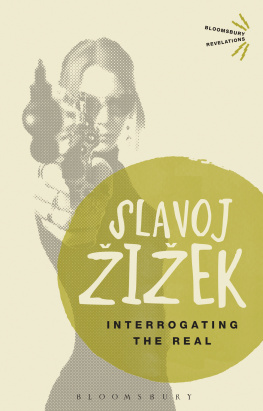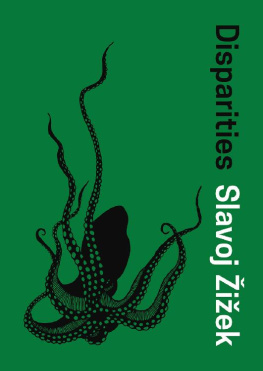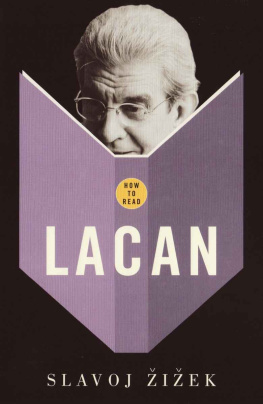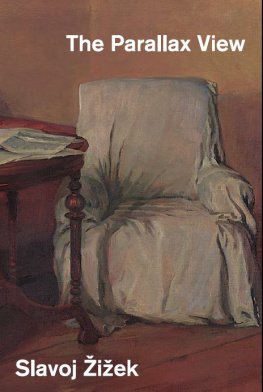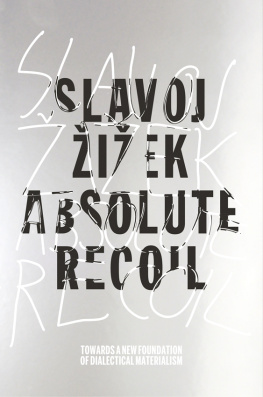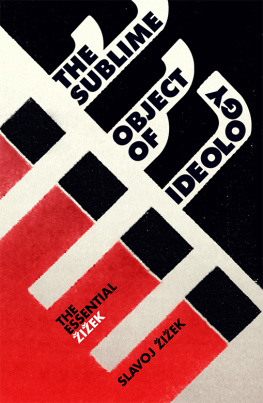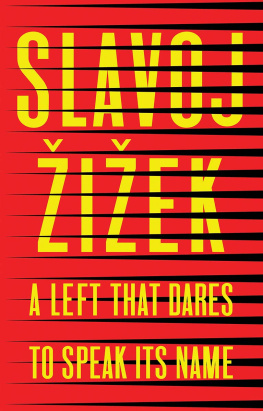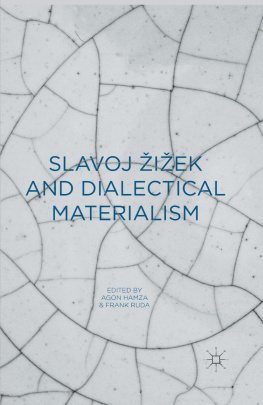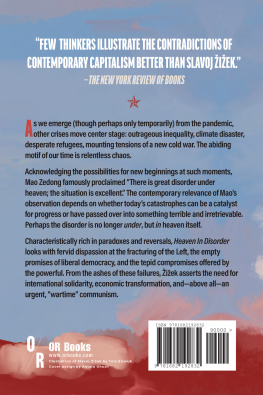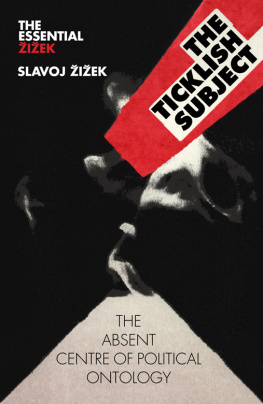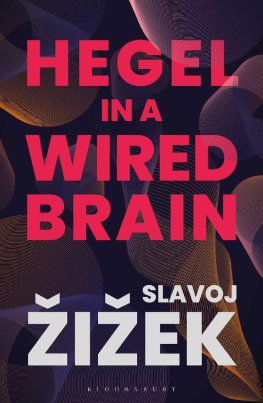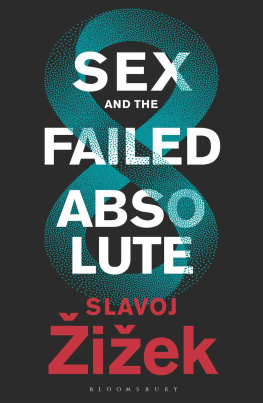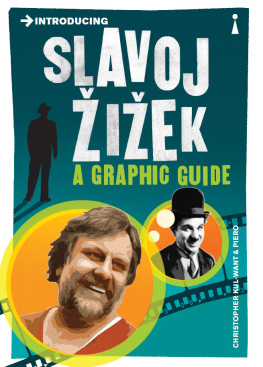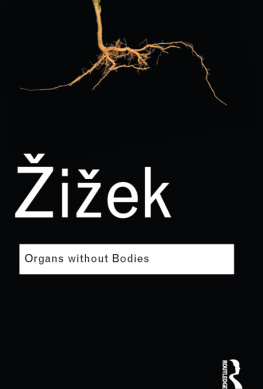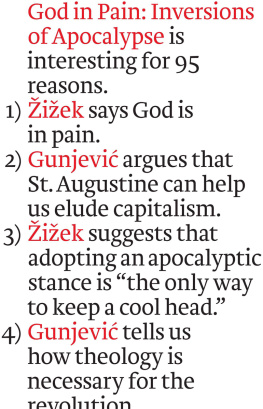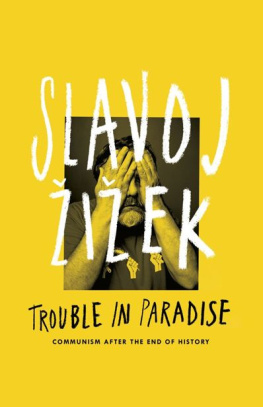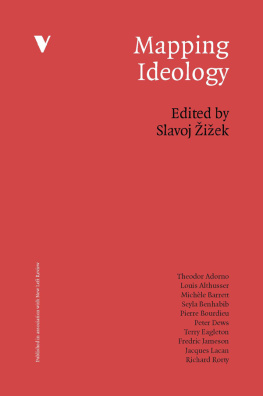Slavoj Zizek - Interrogating the Real
Here you can read online Slavoj Zizek - Interrogating the Real full text of the book (entire story) in english for free. Download pdf and epub, get meaning, cover and reviews about this ebook. publisher: Bloomsbury Academic, genre: Religion. Description of the work, (preface) as well as reviews are available. Best literature library LitArk.com created for fans of good reading and offers a wide selection of genres:
Romance novel
Science fiction
Adventure
Detective
Science
History
Home and family
Prose
Art
Politics
Computer
Non-fiction
Religion
Business
Children
Humor
Choose a favorite category and find really read worthwhile books. Enjoy immersion in the world of imagination, feel the emotions of the characters or learn something new for yourself, make an fascinating discovery.
- Book:Interrogating the Real
- Author:
- Publisher:Bloomsbury Academic
- Genre:
- Rating:5 / 5
- Favourites:Add to favourites
- Your mark:
- 100
- 1
- 2
- 3
- 4
- 5
Interrogating the Real: summary, description and annotation
We offer to read an annotation, description, summary or preface (depends on what the author of the book "Interrogating the Real" wrote himself). If you haven't found the necessary information about the book — write in the comments, we will try to find it.
Interrogating the Real — read online for free the complete book (whole text) full work
Below is the text of the book, divided by pages. System saving the place of the last page read, allows you to conveniently read the book "Interrogating the Real" online for free, without having to search again every time where you left off. Put a bookmark, and you can go to the page where you finished reading at any time.
Font size:
Interval:
Bookmark:
Interrogating the Real
TITLES IN THE BLOOMSBURY REVELATIONS SERIES
Aesthetic Theory , Theodor W. Adorno
Being and Event, Alain Badiou
On Religion, Karl Barth
The Language of Fashion , Roland Barthes
The Intelligence of Evil , Jean Baudrillard
I and Thou , Martin Buber
Never Give In!, Winston Churchill
The Boer War, Winston Churchill
The Second World War, Winston Churchill
In Defence of Politics , Bernard Crick
Intensive Science and Virtual Philosophy , Manuel DeLanda
A Thousand Plateaus , Gilles Deleuze and Flix Guattari
Anti-Oedipus , Gilles Deleuze and Flix Guattari
Cinema I , Gilles Deleuze
Cinema II , Gilles Deleuze
Taking Rights Seriously , Ronald Dworkin
Discourse on Free Will , Desiderius Erasmus and Martin Luther
Education for Critical Consciousness , Paulo Freire
Marxs Concept of Man, Erich Fromm and Karl Marx
To Have or To Be? , Erich Fromm
Truth and Method , Hans Georg Gadamer
All Men Are Brothers , Mohandas K. Gandhi
Violence and the Sacred , Rene Girard
The Essence of Truth, Martin Heidegger
The Eclipse of Reason , Max Horkheimer
The Language of the Third Reich , Victor Klemperer
Rhythmanalysis , Henri Lefebvre
After Virtue , Alasdair MacIntyre
Time for Revolution, Antonio Negri
Politics of Aesthetics , Jacques Ranciere
Course in General Linguistics , Ferdinand de Saussure
An Actor Prepares , Constantin Stanislavski
Building A Character , Constantin Stanislavski
Creating A Role , Constantin Stanislavski
Interrogating the Real , Slavoj iek
Some titles are not available in North America.
Interrogating the Real
Slavoj iek
Edited by Rex Butler and Scott Stephens

Bloomsbury Academic
An imprint of Bloomsbury Publishing Plc
| 50 Bedford Square | 1385 Broadway |
| London | New York |
| WC1B 3DP | NY 10018 |
| UK | USA |
www.bloomsbury.com
Bloomsbury is a registered trade mark of Bloomsbury Publishing Plc
First published 2005
Paperback edition 2006
Slavoj iek, 2005
Editorial material, selection and translation, Rex Butler and Scott Stephans
Bloomsbury Revelations edition first published in 2013 by Bloomsbury Academic
All rights reserved. No part of this publication may be reproduced or transmitted in any form or by any means, electronic or mechanical, including photocopying, recording, or any information storage or retrieval system, without prior permission in writing from the publishers.
No responsibility for loss caused to any individual or organization acting on or refraining from action as a result of the material in this publication can be accepted by Bloomsbury Academic or the author.
British Library Cataloguing-in-Publication Data
A catalogue record for this book is available from the British Library.
ePub ISBN: 978-1-4725-1083-9
Library of Congress Cataloging-in-Publication Data
A catalogue record for this book is available from the Library of Congress.
Contents
The editors would like to thank Sarah Douglas and Hywel Evans for their consistent enthusiasm and patience throughout the preparation of this volume, and Tristan Palmer for first commissioning it.
In particular, Scott Stephens would like to acknowledge the support of the Australian Research Theological Foundation, whose generosity at the early stages of this project was vital for its completion. He is also grateful to Stephen Morton for his assistance in locating and acquiring certain hard-to-find references.
The thing itself appears: Slavoj ieks exemplary thought
While it is by now something of a clich to point this out, it is nevertheless true that the work of Slavoj iek begins with the philosophical concept of the beginning. One thinks immediately of the well-known discussion of this topic in ieks book on Schelling, The Indivisible Remainder, in which he returns to the classic Idealist problem of freedom and the origin of the world. But there are also a number of other instances where iek takes up this concept: for example, the moment of the emergence of human civilization from the undifferentiated domain of animals, the origin of Presocratic philosophy in economic exchange, the birth of capitalism against the background of medieval theology, and indeed the beginning of the very idea of Europe in the primitive Balkans.
Of course, this philosophical quest for first principles runs counter to the usual perception of iek as a pop cultural iconoclast, whose trademark gesture is to collapse genres, level the distinction between high and low cultures and use inappropriate examples to illustrate and ultimately ironize serious philosophical issues. And we would not even argue that this reading is strictly speaking incorrect, only that it does not go far enough. It is, after all, easy and even conventional now to illustrate philosophical or psychoanalytic concepts by means of popular culture. It is further a feature of our contemporary situation that the distinction between high and low cultures has been abolished, making everything equal in value and import. But, in fact, ieks real question is: What allows this confusion to take place? What is the secret distinction, the exception that permits the universalizing of economic and aesthetic value? (Marx was already posing the same question in terms of his generalized conception of the commodity form.)
In his familiar method of reading Lacan through Stephen King, iek is not suggesting that King holds the key to Lacan or that Lacan is reduced to Kings level as just another item in contemporary culture. He is not simply making them equal, or seeing one as providing the truth of the other. Rather, each can be compared to the other precisely because each breaks with any context or framework in which they can be understood. That is, what iek seeks to bring out through holding them together is what is in them more than themselves, something beyond the biographies of their authors, the circumstances of their composition, or even their histories of reception and interpretation.
We may thus observe the following paradox in iek: on the one hand, he operates by a series of analogies or comparisons (we can only understand Lacan through King, or Lacan can only be read in a world in which he exists on the same level as King); on the other hand, he is trying to bring out, by means of this comparison, something that exceeds this context or reading, a sort of innate kernel or formula that at once is repeated throughout his work and occurs each time singularly in the Real of the encounter with a particular author or concept. How to put this another way? In the texts selected here, and throughout his work as a whole, one can find iek reversing his position many times. He writes, as has been noted, prolifically and seemingly with little concern for consistency. It is as though the activity of writing itself is ieks chief motivation, the reason why he writes at all. This is reflected in the very form of his texts, where there is inevitably an unnecessary final chapter, consisting of faits divers or related matters added on, after the main theoretical work of the book has been completed. In fact, strangely enough, what iek actually wants us to see is this very nothingness, this nothing-to-say or empty speech that underlies his texts. Let us call it his theoretical drive, or in more technical language a kind of enunciation without enunciated.
On the other hand, as one reads through these texts and, again, as has been noted we observe a tremendous consistency of approach in iek. He is, in his own words, a dogmatic philosopher, who has remained strictly faithful to his first great loves, Lacan and Hegel, from whom he has never wavered. More than this, we get the uncanny impression that, no matter what iek writes about, however far-fetched or extravagant his examples, he always ends up saying the same thing. It is almost as though his is a predetermined system that follows its own course, despite obstacles or contingencies, personal events in his life or world-historical upheavals. And this finds expression in ieks own work: when he speaks of the analysts discourse as oracular, as beyond interpretation; the meaningless Real of the human genome, which reproduces itself without interruption; and those immortal works of literature like The Iliad, which seem to go beyond any single author. Here, in contrast to that empty speech before, we have a kind of full speech, or to use more technical language an enunciated without enunciation.
Next pageFont size:
Interval:
Bookmark:
Similar books «Interrogating the Real»
Look at similar books to Interrogating the Real. We have selected literature similar in name and meaning in the hope of providing readers with more options to find new, interesting, not yet read works.
Discussion, reviews of the book Interrogating the Real and just readers' own opinions. Leave your comments, write what you think about the work, its meaning or the main characters. Specify what exactly you liked and what you didn't like, and why you think so.

